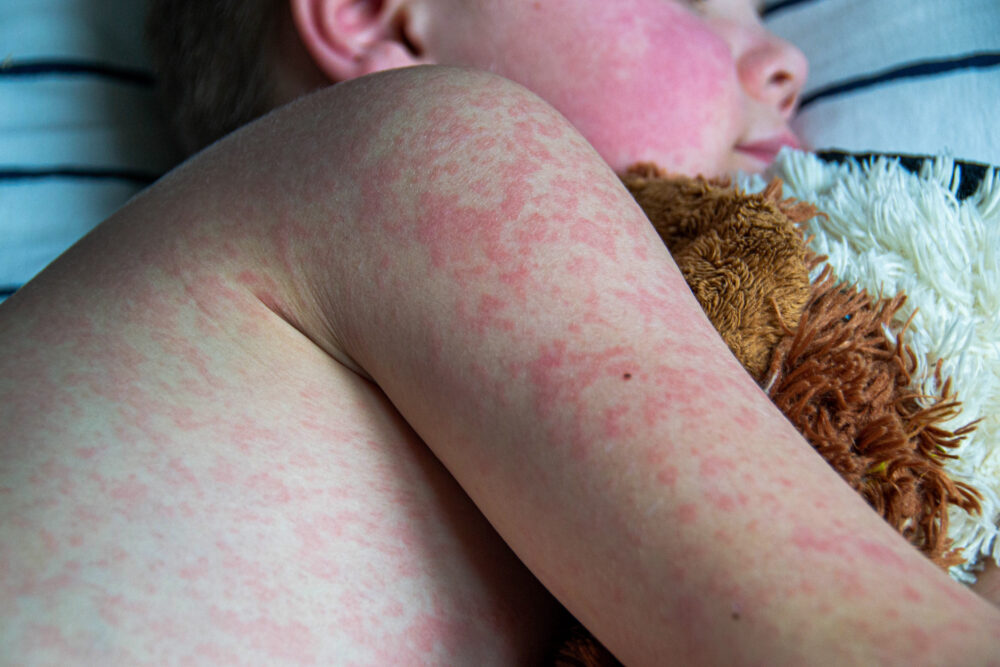WHO warns that measles incidence has increased by 20% worldwide

According to new estimates from the World Health Organization (WHO) and the US Centers for Disease Control and Prevention (CDC), There were approximately 10.3 million measles cases reported worldwide in 2023, an increase of 20% from 2022. Insufficient vaccination coverage worldwide is responsible for the rising number of cases.
Measles can be prevented with two doses of measles vaccine; However, in 2023, more than 22 million children did not receive their first dose of measles vaccine.. Last year, an estimated 83% of children worldwide received a first dose of measles vaccine, while only 74% received the recommended second dose.
Coverage of 95% or more with two doses of measles vaccine is needed in every country and community to prevent outbreaks and protect populations from one of the world’s most contagious human viruses.
“The measles vaccine has saved more lives than any other vaccine in the last 50 years.said Tedros Adhanom Ghebreyesus, Director General of WHO. “To save more lives and prevent this deadly virus from affecting our most vulnerable, we must invest in immunizing everyone, no matter where they live.”
“Measles cases are rising around the world, putting lives and health at risk,” said CDC Director Mandy Cohen. “The measles vaccine is our best defense against the virus, and we must continue to invest in efforts to expand access.”
Gaps in vaccination coverage
As a result of global gaps in vaccination coverage, 57 countries experienced large or severe measles outbreaks in 2023, affecting all regions except the Americas, representing a nearly 60% increase from 36 countries in the previous year. WHO regions in Africa, Eastern Mediterranean, Europe, South-East Asia and Western Pacific have seen significant increases in cases. Almost half of all large-scale or severe outbreaks occurred in the African region.
New data suggests that In 2023, about 107,500 people died from measles, mostly children under five.. Although this is 8% less than last year.too many children are still dying from this preventable disease. This slight decline in mortality was mainly due to an increase in the number of cases in countries and regions where children are less likely to die from measles due to improved nutrition and access to health services.
Even if people survive measles, they can suffer serious health consequences, some of which last a lifetime. Infants and young children are at greatest risk for serious complications from the disease, including blindness, pneumonia, and encephalitis (an infection that causes inflammation of the brain and possibly brain damage).
Goal of measles elimination
As measles cases and outbreaks increase, The global elimination target set in the 2030 Agenda for Immunization is at risk. By the end of 2023, 82 countries had achieved or maintained measles elimination worldwide.. This week, Brazil was again confirmed to have eliminated measles, making the WHO Region of the Americas free of endemic measles. With the exception of the African Region, at least one country in all WHO regions has eliminated the disease.
This is necessary toCountries and partners are taking urgent and targeted action, especially in the African and Eastern Mediterranean regions, as well as in fragile, conflict-affected and vulnerable countries, to vaccinate all children with two doses of measles vaccine. This requires establishing and maintaining high-impact, systematic immunization programs and high-quality, high-coverage campaigns when these programs are still insufficient to protect all children.
Countries and global immunization partners are also Disease surveillance should be strengthenedincluding the Global Measles and Rubella Laboratory Network (GMRLN). Robust disease surveillance is essential to optimize immunization programs and quickly detect and respond to measles outbreaks to mitigate their size and impact.
Measles elimination is defined as the absence of endemic transmission of measles virus in a region or other defined geographic area for more than 12 months.. Conversely, a country is no longer considered measles-free if the virus returns and transmission continues uninterrupted for more than a year.
